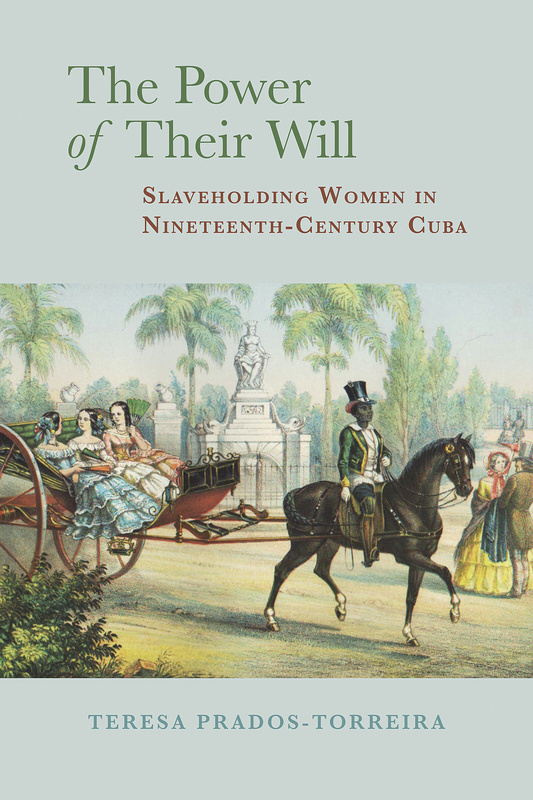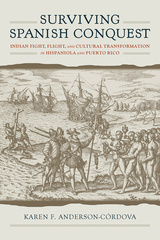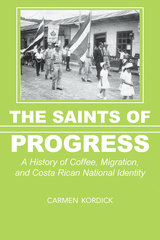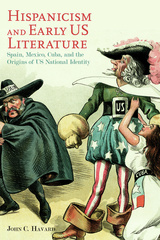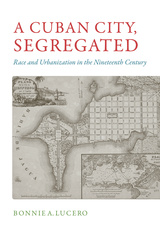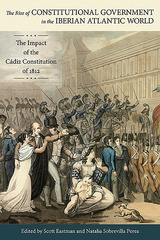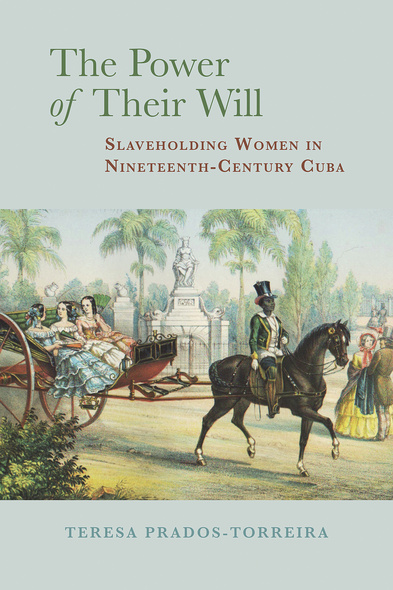
144 pages, 6 x 9
7 B&W figures - 2 maps
Hardcover
Release Date:26 Jan 2021
ISBN:9780817320799
The Power of Their Will
Slaveholding Women in Nineteenth-Century Cuba
University of Alabama Press
A Choice Outstanding Academic Title, 2022
A valuable narrative of the often paradoxical and conflicting human bonds between female owners and the enslaved in nineteenth-century Cuba
In the early nineteenth century, while abolitionism was rising and the slave trade was declining in the Atlantic world, Spain used this opportunity to massively expand plantation slavery in Cuba. Between 1501 and 1866, more than 778,000 Africans were torn from their homelands and brought to work for the Cuban slaveholding class.
An understudied aspect of Cuban slaveholding society is the role of the white Cuban slave mistress (amas). The Power of Their Will: Slaveholding Women in Nineteenth-Century Cuba illuminates the interaction of female slaveholders and the enslaved during this time. Teresa Prados-Torreira shows, despite the lack of political power in a highly patriarchal society, Cuban women as property owners were instrumental in supporting the long duration of slavery, whether by enforcing the disciplining of the enslaved in the domestic sphere or helping to create the illusion of slavery as a humane institution. Thousands of Creole slaveholding women relied on slaves to lead a comfortable life. Even the subsistence of many poor women depended on the income derived from the hiring out of their enslaved.
In this accessible cultural history, culled from government documents, fiction, newspaper articles, traveler’s accounts, women’s wills, and archival research, Prados-Torreira coalesces a valuable narrative out of the often paradoxical and conflicting stories of the human bonds between the female owner and the enslaved. Narrative chapters, enlivened by vignettes, describe the daily life of slave mistresses in the main cities of Havana and Santiago and other towns, workings of sugar mills and coffee plantations, how slaveholding women coping with slave rebellions and wartime during the Ten Years’ War, and how personal relationships could occasionally affect the balance of power.
A valuable narrative of the often paradoxical and conflicting human bonds between female owners and the enslaved in nineteenth-century Cuba
In the early nineteenth century, while abolitionism was rising and the slave trade was declining in the Atlantic world, Spain used this opportunity to massively expand plantation slavery in Cuba. Between 1501 and 1866, more than 778,000 Africans were torn from their homelands and brought to work for the Cuban slaveholding class.
An understudied aspect of Cuban slaveholding society is the role of the white Cuban slave mistress (amas). The Power of Their Will: Slaveholding Women in Nineteenth-Century Cuba illuminates the interaction of female slaveholders and the enslaved during this time. Teresa Prados-Torreira shows, despite the lack of political power in a highly patriarchal society, Cuban women as property owners were instrumental in supporting the long duration of slavery, whether by enforcing the disciplining of the enslaved in the domestic sphere or helping to create the illusion of slavery as a humane institution. Thousands of Creole slaveholding women relied on slaves to lead a comfortable life. Even the subsistence of many poor women depended on the income derived from the hiring out of their enslaved.
In this accessible cultural history, culled from government documents, fiction, newspaper articles, traveler’s accounts, women’s wills, and archival research, Prados-Torreira coalesces a valuable narrative out of the often paradoxical and conflicting stories of the human bonds between the female owner and the enslaved. Narrative chapters, enlivened by vignettes, describe the daily life of slave mistresses in the main cities of Havana and Santiago and other towns, workings of sugar mills and coffee plantations, how slaveholding women coping with slave rebellions and wartime during the Ten Years’ War, and how personal relationships could occasionally affect the balance of power.
Like no other work on the subject I am aware of, The Power of Their Will gives the reader the information needed to gain insights into the external lives of Cuban slaveholding women as they went about their prescribed tasks and permissible pleasures.’
—D. J. Walker, editor and translator of Manuel Ciges Aparicio’s On Captivity: A Spanish Soldier’s Experience in a Havana Prison, 1896–1898
‘The Power of Their Will is engaging and draws on evocative examples primarily from traveler’s accounts, notarial records, and petitions for reversals of property confiscations during the Cuban War of Independence.’
—Adriana Chira, assistant professor of Atlantic World history at Emory University
‘This is an accessible, illuminating study of women’s roles in sustaining slavery during its apogee in Cuba. It will surely find a wide readership, from undergraduate students approaching Cuban history for the first time to specialist historians.’—Hispanic American Historical Review‘The Power of Their Will is a rich and valuable book and an essential acquisition for scholars seeking to understand more fully the intersections between gender and enslavement in Cuba, the Caribbean, and the Atlantic world.’ —New West Indian Guide‘The concise nature of The Power of Their Will makes it an excellent choice for undergraduate or graduate-level seminars on Atlantic history, slavery, and women’s studies.’ —Bulletin for Spanish and Portuguese Historical Studies
This fascinating book explores the unique circumstances of white slaveholding women in 19th-century Cuba and the enslaved peoples they controlled. The subject of women slaveholders and their interactions with their enslaved workers has been largely overlooked in broader discussions of Cuban cultural history. These complex relationships were negotiated differently between urban contexts, such as Havana, and the rural contexts of coffee and sugar plantations. The urban/rural dichotomy outlined here examines the occupational differences of enslaved workers and reveals distinct strategies slaveholding women used to navigate the patriarchal structures of 19th-century Cuban society. Unlike their male counterparts, slaveholding women were anomalous, yet they actively upheld the coercive structures of slavery. Prados-Torreira skillfully investigates newspapers, travelers’ accounts, government documents, and other documentary sources to build her study. This is a must read for scholars of the Caribbean and the African diaspora. Essential.’
—CHOICE
‘This engrossing and elegantly written study foregrounds the lives, importance, and influence of female slave owners in Cuba in the 1800s. It fills a gap in Cuban, women’s, and slave history that scholars have ignored. Drawing on a wide variety of sources, ranging from fiction, wills, and foreign travelers’ accounts, Prados-Torreira draws a compelling portrait of the largely Creole women who owned and profited from the enslaved. Her nuanced story makes clear the extent to which owning other human beings gave female slave owners power and status even as the patriarchal norms of Cuban society subordinated and limited them. It also reveals the complex relations that existed between the slave mistresses and the enslaved and, in the process, sheds new light on both groups on both a social and intimate level.’
—Margaret Power, author of Right-Wing Women in Chile: Feminine Power and the Struggle against Allende, 1964–1973
Teresa Prados-Torreira is professor of American history at Columbia College Chicago. She is author of Mambisas: Rebel Women in Nineteenth-Century Cuba.

